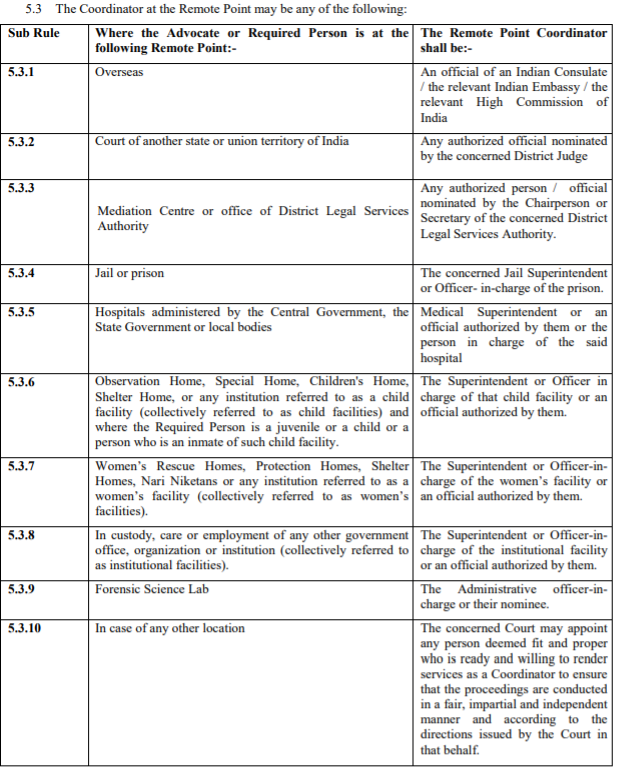[Read Rules] Delhi High Court notifies new Video Conferencing Rules
The Delhi High Court has notified the “High Court of Delhi Rules for Video Conferencing of Court”. It notified the rules on 26th October 2021.
The rules include the general principles governing video conferencing, required facilities and preparations to conduct proceedings through video conferencing, and the procedure for appearance, evidence, and submission. The court will conduct such proceedings only through the designated video conferencing software.
What proceedings can the court conduct?
The court has allowed video conferencing for all stages of judicial proceedings. All relevant statutory provisions that are applicable to a judicial proceeding shall apply to proceedings conducted through video conferencing. A person participating in the proceeding (including advocate, witness, etc.) shall provide identity proof the the ‘Court point’ coordinator via personal email.
The rules bar unauthorized recording of the proceedings by any person or entity.
Coordinators will facilitate proceedings
For any such proceeding, there shall be a Coordinator at the court point. Further, a coordinator shall be present at the remote point as well(from where persons are appearing), if the person appearing is a witness or accused to be examined.
The High Court or the District Judge shall appoint Coordinators at the court point as well as remote point. The following can be a coordinator at the Remote Point.

In case any witness needs any record of proceeding in a case, the Court shall transmit non-editable digital scanned copies of all or any part of such record. The court shall send the record to the official email account of the Coordinator.
Application for Video Conferencing
Any party to a proceeding, or witness, may move a request for video conferencing, as per the form prescribed in Schedule II. Upon receiving the application, the court will pass an order. However, the court shall ascertain that the application “is not filed to impede a fair trial or to delay the proceedings”.
Further, the court may require the Advocate to submit written arguments and precedents in advance on the official email ID of the court.
In civil cases, parties requesting video conferencing shall confirm to the court, the location of the person making statements, the willingness of the person, and the availability of technical facilities at the agreed-upon time and place.
In criminal proceedings, the counsel for the prosecution or defence shall confirm to the court the location of the person, willingness to be examined by video conferencing and the time, place and technical facility for such video conferencing.
Examination of Persons
Proof of Identity: Any person being examined, including a witness, shall file a proof of identity issued by the Central/ state government before being examined. The Coordinator at the Remote Point will administer the oath to the witness. The burden to transmit documents to the witness before the examination rests on the applicant.
Exhibiting Documents: If the court examines a person concerning a particular document, then the summons to such person must accompany the duly certified copy of the document. If it is necessary to show a document to the person during the course of examination, the court can use a ‘document visualizer’. If the document is available at the remote point, then the coordinator at the remote point will transmit the document through a document visializer. Further, the witness and the coordinator shall sign the document and speed post/ courier the document to the court.
Attorney-Client Privilege: Regarding the testimony of imprisoned accused persons, the court shall provide adequate opportunity to such person(s) to consult in privacy with their counsel before, during, and after the video conferencing.
Demeanour & Signing the testimony: The court would be at liberty to record the demeanour of the person being examined. Further, the court will obtain the signature of such a person, either through digital signatures. If the facility for a digital signature is unavailable, the court will send a non-editable scanned format to the official email account of the remote point, a printout of which shall be signed by the person.
Preserving the proceeding: The court will preserve an encrypted version of the audio-visual recording of the examination, along with the hash value.
Judicial Remand through video-conferencing?
The rules do not allow granting judicial remand in the first instance or police remand through video conferencing. The court can only do so in exceptional circumstances for reasons to be recorded in writing.
Regarding the recording of statements under Section 164 or 313 Cr.P.C, the court can only do so in exceptional circumstances for reasons to be recorded in writing. Further, the court will have to make sure that the witness or the accused is free of any form of coercion, threat or undue influence.
Cost of Proceedings
In criminal cases, the court will determine as to which party shall bear the cost of video conferencing. The cost may include preparing soft copies/ certified copies of the court record, and the fee payable to any translator.
In civil cases, the party requesting video conferencing will bear the expenses.
You can read the full notification below.
Do subscribe to our Telegram channel for more resources and discussions on tech-law. To receive weekly updates, don’t forget to subscribe to our Newsletter.

